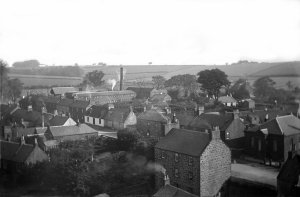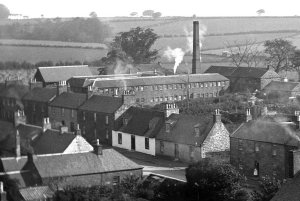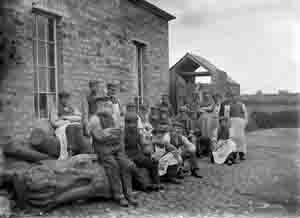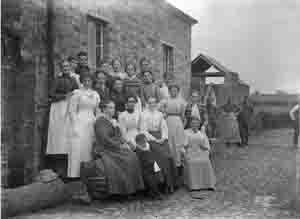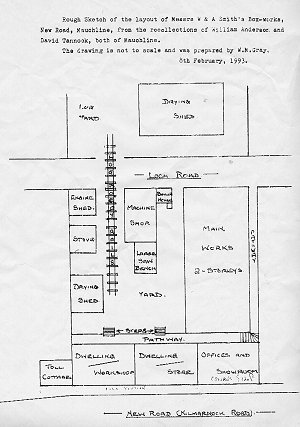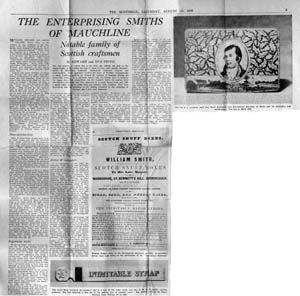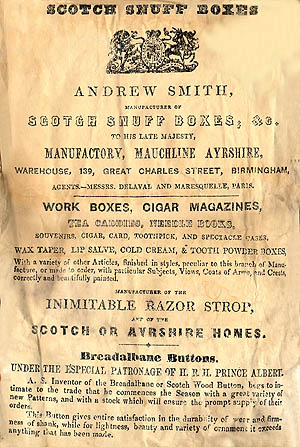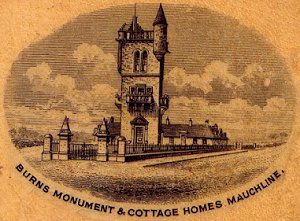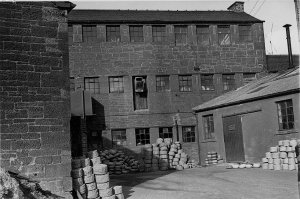Davidson,
Wilson and Amphlet / Wilson and Amphlet
Text
via Alex Wilson
Wilsons
were always involved with the Mauchline Box Works Industry. It started
with Robert Wilson, known as "The Gallant Weaver", from the
song Robert Burns wrote about him. According to research carried out
by his descendant, John Wilson, he was living in Loudoun Street, Mauchline,
in the early 1800’s and married to Margaret Thomson of Maybole,
Ayrshire. They had nine children.
Mr Wilson’s
researches say Robert Wilson the Gallant Weaver's second eldest child
John did marry and had eight children. The eldest of these, another
Robert, started up in partnership in 1855 with John Davidson, manufacturing
Snuff Boxes, Tartan and Fancy Woodware at Grey’s Bridge, Back
Causeway (Castle Street), close to the Burns House Museum, Mauchline.
A third partner Samuel Amphlet of Birmingham joined the business about
1856. On 1st April 1859 the firm now Davidson, Wilson and Amphlet, moved
to a new factory at Victoria Works, Barskimming Road, Mauchline. The
move to the new factory was well timed as the Great Mauchline Flood
of 1859 extensively damaged the empty manufactory. It is reported in
the 1861 census, held in the Register Office Edinburgh that the firm
employed 47 men, 31 women, 20 boys and 10 girls.
In 1864 John Davidson relinquished his one third share in the company
to Robert Wilson and Samuel Amphlet who continued to trade at the same
location as “Wilson and Amphlet” - Box Manufacturers.
On 20th
August 1867 Robert Wilson, with the consent of Samuel Amphlet transferred
his share of the business to his 35 year old nephew Edward McEwan. Robert
Wilson died a bachelor age 54 in 1871. He was highly regarded and The
Ayr Advertiser said in his obituary “Mr Wilson did a great deal
to extend The Fancy Wood Trade. He was highly respected for the interest
he took in the working classes, and for the unostentaneous manner in
which he rendered to the poor. Out of respect for his memory all public
works and shops in Mauchline closed at the time his body was conveyed
to the churchyard”.
By an extraordinary coincidence on the day of the funeral a fire broke
out at the Wilson and Amphlet Box Works.
THE AYR
ADVERTISER REPORTED:
MAUCHLINE
EXTENSIVE FIRE - £1000 WORTH OF PROPERTY DESTROYED
Early on Thursday morning a fire broke out in the box work belonging
to Messrs Wilson, Amphlet & Co., Mauchline, which destroyed the largest
and best portion of the manufactory. Shortly after twelve o'clock fire
was seen issuing from the building in the north end, and the alarm being
given, the whole of the inhabitants turned out and made every effort
to extinguish the flames. Despatches were sent off to Catrine and Kilmarnock
fire engines, and water was supplied by a line of water passed through
the streets from the rivulet Chalk.
In
a short time, the flames got into the adjoining building, and raged
fiercely for about two hours, completely destroying the whole three
flats, which were occupied as turning, varnishing, and finishing shops.
By the help of Catrine fire engine, the south portion of the work was
saved, the communication being cut, and water freely played on the doors,
windows, and gable. Great praise is due to the inhabitants, both male
and female, for their exertions to extinguish the fire, which is the
largest we have had for many years. Fortunately no one was seriously
hurt. The loss, which is partly covered by insurance, will amount to
upwards of a thousand pounds. The property destroyed consists chiefly
of machinery, manufactured goods, &c.
No
one can say how the fire originated, as the buildings are all heated
by steam, and the resident partner, Mr McEwing (Edward McEwan) saw the
premises locked up, and all right, about ten o'clock. A large number
will be thrown out of work for some time by the occurrence. It was a
somewhat striking coincidence, that the funeral of Robert Wilson, Esq.,
the head partner of the firm, and who was for many years its manager,
took place on the same day that the fire broke out. Mr Wilson did a
great deal to extend the fancy wood trade. His death, which was very
sudden, was caused by the bursting of a blood vessel. He was highly
respected for the interest he took in the working classes, and for the
unostentatious manner in which he rendered assistance to the poor. Out
of respect for his memory, all the public works and shops in town were
closed while his remains were being conveyed to the churchyard.
It is not
known what affect the fire had on production and the Partnership continued
to trade until 1885. For 25 years they produced a wide range of high
quality Mauchline Ware, held a Royal Warrant and for a while were the
main competitors of W and A Smith. Edward McEwan was in charge of the
factory and was responsible for the sales operation in Scotland where
he had many highly regarded sales outlets including The Burns Monument
Trust Alloway, Anderson Bookseller Dunkeld (see needle case below),
Shearer Stirling and James Soutter of Princes Street Edinburgh. Sammy
Amphlet covered England and Overseas from the Birmingham office. He
was a very lively and creative character, and had many patents registered
in his name. The Birmingham branch turnover was larger than that of
the head office in Mauchline. The firm also made other products such
as fastenings for belts and bands patented in 1856 by John Morrison
and Samuel Amphlet. Morrison a brother in law of Robert Wilson was a
superintendent of a steel pen manufactory in Birmingham.
On 8th January 1885 Samuel Amphlet and Edward McEwen, as Trustees of
the firm of Wilson and Amphlet, disposed of the property to George Smith,
William Robert Smith and William Smith of the firm of W and A Smith,
Box Manufacturers Mauchline. Sammy Amphlet at 54 continued actively
in business and died in 1904. Edward McEwan like his Uncle Robert played
an active part in helping his fellow villagers and died in 1902. He
is buried in Mauchline New Cemetery. Part of the factory remains and
is used by Andrew Kay and Co Ltd. who produce curling stones of a standard
and finish acclaimed world wide.
